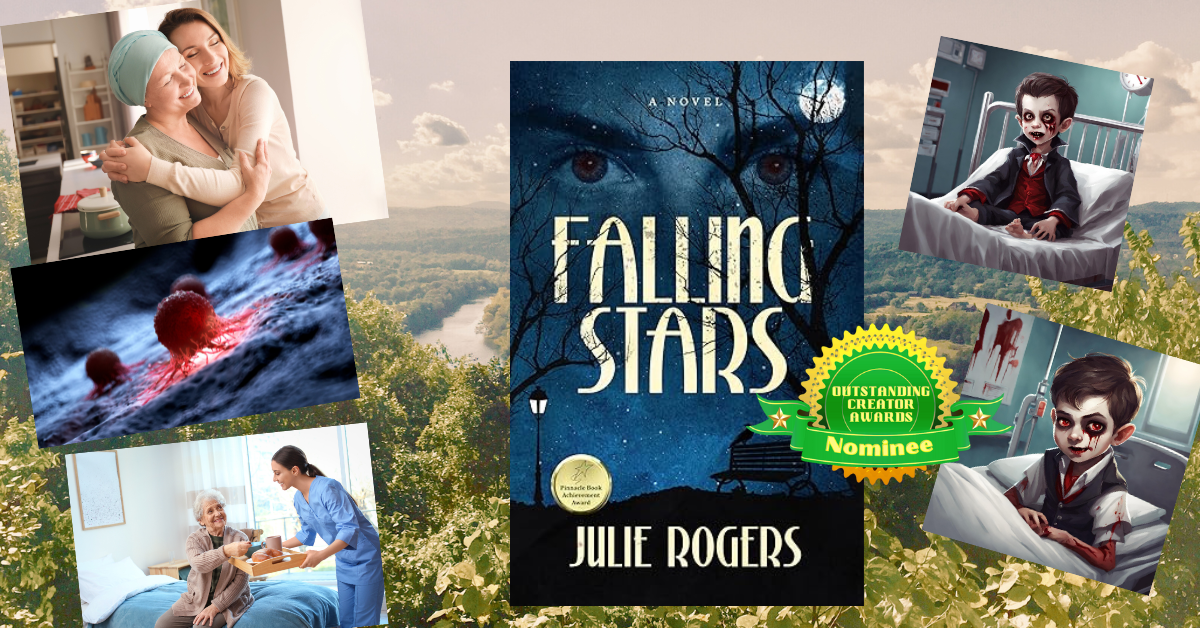|
Score: 88 out of 100 (8.8 out of 10)
Falling Stars by Julie Rogers is an extremely ambitious novel that blends several different genres: vampire literature, historical fiction, and even medical fiction. The novel surrounds a nine-year-old vampire boy named Tommy who is sick and possibly terminally ill, inflicted with a form of childhood cancer. He is taken in by a compassionate and highly conscientious hospice nurse named June who quickly realizes that Tommy is an unusual and very special boy. June and her family swiftly form a loving bond with Tommy, taking him along on their family outings. They even commission a special coffin for him complete with its own life support and entertainment system, including replicating a race car or amusement park ride. Yes, really! Tommy becomes enamored with a magazine titled Philly's Argosy which includes a rather striking story about another child—a Welsh aristocrat named Fallon— who suffered from the same form of cancer and sought a cure in Eureka Springs, Arkansas. Fallon's sister, Viscountess Agnetha, died of leukemia on the same quest for a cure, making Fallon more determined to find it. The waters of Eureka Springs were believed by Native Americans to possess curative properties. An unscrupulous quack named Norma Baker built a “Cure for Cancer” hospital there, hoping to take advantage of this mythic publicity and the desperation of cancer sufferers and their families. This book takes you from 1939 in the early days of WWII to 2023 with race riots and COVID running wild. It takes you from Cardiff to Arkansas. It challenges the reader with ethical issues such as: what does it mean to really live? Is it worth living if living means suffering? Should we prioritize someone's quality of life or their quantity of life? This book is far from an easy read. We read this book multiple times just to piece everything together. We still probably missed things. Therein probably lies the books weakness: it is very complicated and convoluted, overly so. There was no really good reason to make Tommy a vampire other than for marketing purposes (as vampire literature sells). However, this isn't the kind of vampire novel that would likely appeal to a vampire lit connoisseur. First of all, this isn't really a romance. This is more like a found-monster story similar to something like E.T. There really is too much going on. There are characters like Chelsea who get introduced and given a significant amount of page/screen-time for really no discernible reason. We hate to admit this, but Tommy himself really seemed like a flat character to us. He's like Kurasama in School Rumble or Akira in Akira--he comes across as this blank-slate, enigmatic character who is at the center of everything and yet in the background of everything. In a sense, he's a passive protagonist, which is frustrating when he is technically the main character. It almost always seems like all of the characters are doing everything for him—trying to care for him, trying to improve the situation, trying to advance the plot. It doesn't seem like Tommy talks much, or that he can talk much. Maybe his cancer has affected his cognitive abilities or enlarged his lymph nodes so he can't talk, we're not sure. But he just doesn't pack the punch that we think the author was going for. Case in point is June, who is the real main protagonist (in our opinion). June is the most real-seeming character, and she is likely based on the author's own experience as a nurse dealing with very sick patients. June is always doing her best for Tommy. She's always trying to fight the good fight and to do the right thing. June, in a lot of ways, is the literary foil to Baker. She represents those involved in the medical field/healthcare who actually love and care about their patients. These are people who actually want their patients to be both health and happy. They're not in it just for the money, they're in it because it gives them an opportunity to help the most people possible. We can definitely understand where June is coming from. So, we think we might know why this book comes across as more disjointed and jumbled than some of the the author's other works. It's because the author is a lifelong pantser—someone who is used to writing on the fly rather than following a strict outline. Well, guess what? They decided to run an experiment with this novel and outline/plot everything. This is probably why the book reads in a more choppy, broken, and disjointed way than we're used to. The author was attempting to do something far outside their comfort zone—something very different to what got them to the dance. It show, for better or for worse. You get the sense that parts of this book were written in the early 2000s and other parts were written last week. You get the sense that something just seems... off. However, we do commend the author for trying something new and different, something that challenged them. We also commend the amount of research that the author went through to construct this book that crosses multiple periods of time and across seas/continents. Check this out on Amazon!
0 Comments
Leave a Reply. |
Archives
July 2024
Categories |

 RSS Feed
RSS Feed